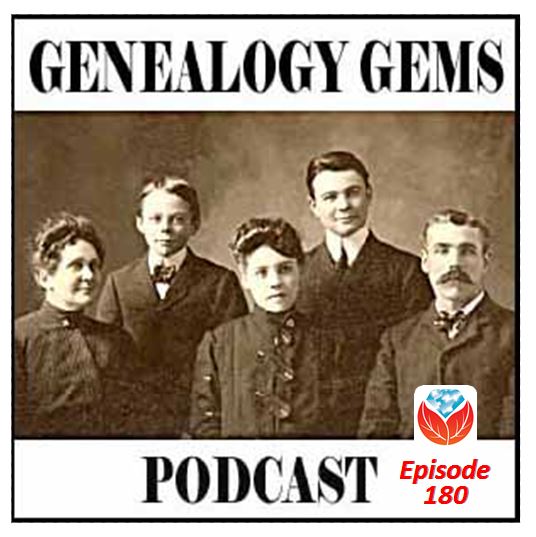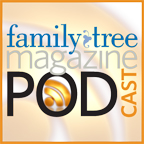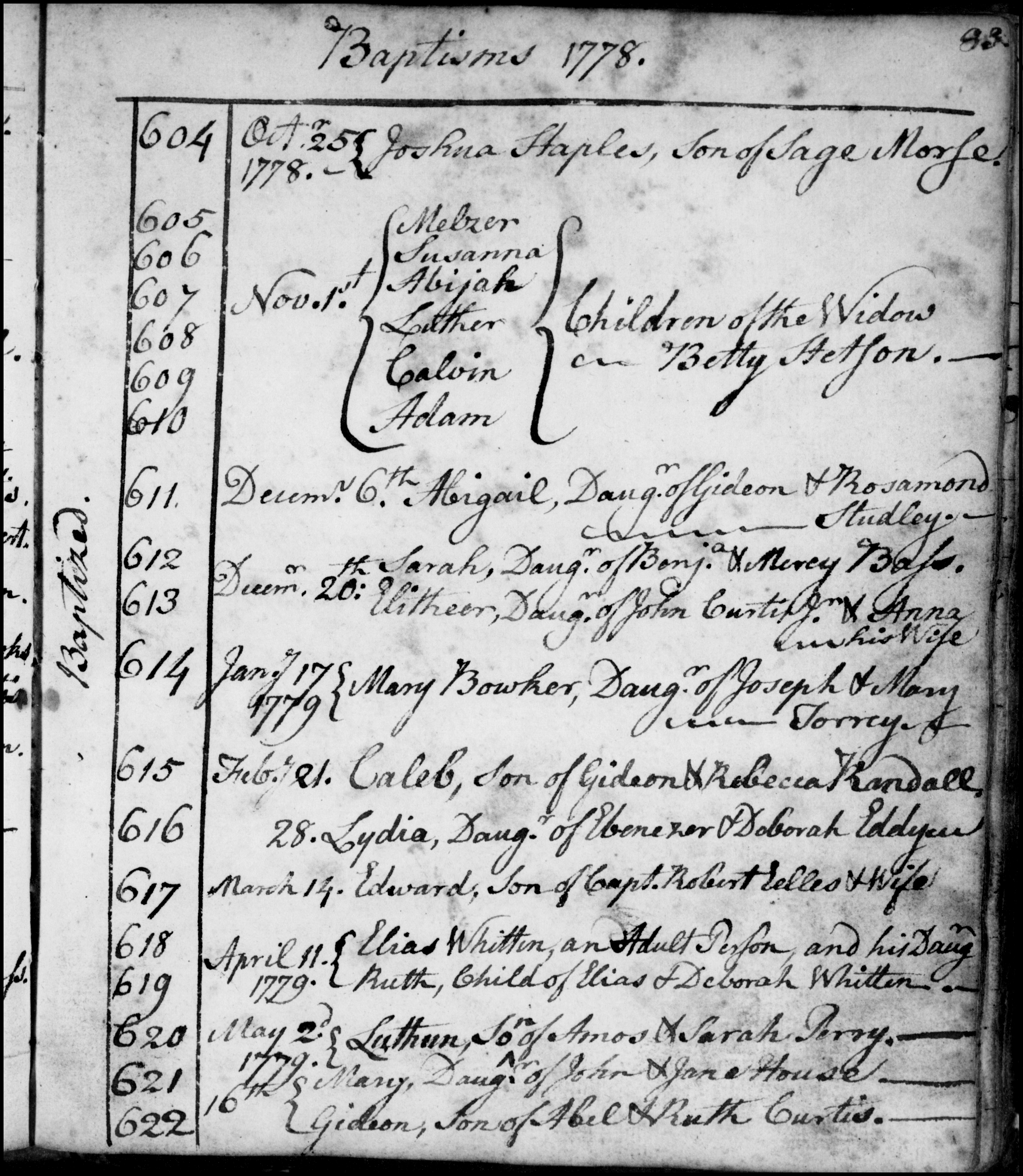by Lisa Cooke | Jun 20, 2015 | 01 What's New, Ancestry, Book Club, Canadian, Digital Archives, Disaster Prevention, FamilySearch, Genealogy Gems Podcast, Google, Military, Travel, United States
 The free Genealogy Gems Podcast episode 180 has been published! Click here to enjoy an episode about big names, like Ancestry and Google and FamilySearch. And big numbers, like the possible price tag for Ancestry at auction, AND small numbers, like the small price of a new handheld computer.
The free Genealogy Gems Podcast episode 180 has been published! Click here to enjoy an episode about big names, like Ancestry and Google and FamilySearch. And big numbers, like the possible price tag for Ancestry at auction, AND small numbers, like the small price of a new handheld computer.
In this episode, we’re also talking about researching on road trip tips, an important online Civil War database, a leading Canadian digital archive and EXCLUSIVE tips for using FamilySearch’s free digitized book collection, which now tops 200,000 titles. Because we’ve gotten so much demand for it, we’re also sharing tips for backing up your data at Ancestry–not just your tree but your sources and DNA, too.
 This month we also feature a meaty excerpt from our interview with Nathan Dylan Goodwin, author of The Lost Ancestor (The Forensic Genealogist). (Premium subscribers can catch the full interview in Premium episode 124, to be published soon.) He tells us how he got started. We talk about the plot and characters and the challenges of creating genealogical mysteries with dangerous consequences for the present and more!
This month we also feature a meaty excerpt from our interview with Nathan Dylan Goodwin, author of The Lost Ancestor (The Forensic Genealogist). (Premium subscribers can catch the full interview in Premium episode 124, to be published soon.) He tells us how he got started. We talk about the plot and characters and the challenges of creating genealogical mysteries with dangerous consequences for the present and more!
Mixed in with all this news and how-tos is an assorted cast of listeners-with-questions and an inspiring story about long-lost siblings reunited by radio. Enjoy!

by Lisa Cooke | May 24, 2015 | 01 What's New, Canadian, Digital Archives, images, Libraries, Memory Lane, Records & databases
 Do you have Canadian roots? Then Canadiana should be on your list of online resources searched regularly for family history information.
Do you have Canadian roots? Then Canadiana should be on your list of online resources searched regularly for family history information.
Recently Newswire.ca described Canadiana as “a digital initiative of extraordinary scale,…a joint effort of 25 leading research institutions, libraries and archives working together with the goal of creating Canada’s multi-million page, comprehensive online archive.” Its digital collections chronicle Canada’s past since the 1600s and most of its content is free.
What we especially noticed in a recent peek at this enormous Canadian digital archive:
- The Héritage Project. This FREE resource “aims to digitize, preserve and make accessible Canada’s archival materials for Canadians and the world. Héritage is also a pathfinder project to determine the best ways to organize and fund ongoing efforts to make all of Canada’s remaining documentary heritage accessible online.” Their large collection of genealogy materials so far includes immigration records, church records, land records, family histories, voters’ lists and more. Military history, government documents and aboriginal records are also well-represented. Tip: check back often! More is coming, like local and regional newspaper digitization and records of the Canadian Expeditionary Forces.
- The Canadiana Discovery Portal. This gateway to digital collections from 40 repositories points to 65 million pages! Sample subjects include Ontario genealogy and War of 1812 campaigns. This portal is also free to use.
- Early Canadiana Online, with 5 million images already and expected to grow to 16 million. This part of the website requires a subscription ($10/month or a year for $100) This is “a full-text collection of published documentary material, including monographs, government documents, and specialized or mass-market periodicals from the 16th to 20th centuries. Law, literature, religion, education, women’s history and aboriginal history are particular areas of strength.” The site describes itself as “the most complete set of full-text historical content about Canada, including books, magazines and government documents.” Tip: scroll down on the home page to click the Genealogy and Local History portal, but don’t ignore the rest of the site!
 Like this post? Here’s a few more posts you may enjoy:
Like this post? Here’s a few more posts you may enjoy:
If more posts like these are what you’re looking for, sign up for our free email newsletter. You’ll get Lisa Louise Cooke’s free Google Research e-book when you do! From our home page, enter your email in the sign-up box.
by Lisa Cooke | Sep 23, 2014 | 01 What's New, Digital Archives, Family Tree Magazine, Organization, Preservation
 Autumn gives me the urge to organize and prepare for the future. That’s why I think the new Family Tree Magazine podcast episode is especially timely.
Autumn gives me the urge to organize and prepare for the future. That’s why I think the new Family Tree Magazine podcast episode is especially timely.
Lisa hosts the September 2014 Family Tree Magazine podcast with these highlights:
- News from the Blogosphere with Diane Haddad;
- Preservation tips from the Family Archivist columnist, Denise Levenick;
- Digital archiving websites from the current 101 Best Websites list;
- Genealogy estate planning with Family Tree University dean Tyler Moss;
- and roundup preparedness tips from Publisher Allison Dolan.
For more on disaster planning for genealogists, check out our four-part blog post series on it. Click here for the first one.
by Lisa Cooke | Jan 29, 2014 | 01 What's New, Church, Records & databases, Volunteer
If you have New England roots, you need to know about New England’s Hidden Histories, an ongoing project of the Congregational Library in Boston,  Massachusetts. This project is collecting, digitizing, indexing and posting online New England church records, a vital source for finding your family’s vital records in New England.
Massachusetts. This project is collecting, digitizing, indexing and posting online New England church records, a vital source for finding your family’s vital records in New England.
“Congregational church records are an unparalleled source of information about the religious activities of the early colonists, and about many other aspects of early American life as well,” says the Congregational Library website. ” They provide a richly detailed view of town governments and social customs, data on births and marriages and deaths, and demonstrate the ways that ordinary people participated in community-wide decision-making — information that is simply not available in any other records from that time.”
Until recently, many Congregational church records were “mostly scattered across New England, in church closets, bank vaults, or the offices of town clerks,” explains the site. “Many have been left exposed to the elements and are in danger of deterioration, or are all but impossible for the average researcher to locate.”
The Congregational Library is spearheading the effort to collect, digitize, index and make available to researchers as many of these records as possible. To date, says Digital Archivist Sari Mauro, “We currently have 17 collections online, and several more at various places in our workflow. Of these collections, two are fully transcribed. We eventually hope to be able to display all of our collections with full-text transcriptions.”
They are looking for more volunteers to transcribe these records. Would you like to help? Click here to learn more.
By the way, this collection goes beyond just baptism, marriage and death records, in an attempt to fully document church life of the times. “Our current collections vary in size from 20 pages to 2,000+ pages and address a number of topics including church founding, church membership, births and deaths, church discipline, pastoral salary, church and community controversy, and issues of doctrine and practice.”
by Lisa Cooke | Sep 30, 2013 | 01 What's New, Inspiration, Organization
 This post wraps up our four-week series on disaster planning for genealogists in honor of National Preparedness Month in the United States. In previous weeks, I talked about assessing our collections of family history artifacts and research materials; creating duplicates of one-of-a kind items; and protecting our most valuable items properly.
This post wraps up our four-week series on disaster planning for genealogists in honor of National Preparedness Month in the United States. In previous weeks, I talked about assessing our collections of family history artifacts and research materials; creating duplicates of one-of-a kind items; and protecting our most valuable items properly.
Last but certainly not least in our preparedness process, we want to share what we have with others and keep our digital files fresh. I’ll cover both of these steps in this post.
SHARE! First, after you’ve copied, scanned or photographed your family archive, spread your digital archive around by sharing it with others. If you leave all your files on the computer in the same building as your originals (your home), one house fire or theft could easily take out both your original and your carefully-made backups. Instead, disseminate your copies to at least two additional physical locations.
For electronic data, I recommend cloud storage like Dropbox, or iCloud. That immediately gets a copy away from your physical home base, but keeps it accessible to you (and others, if you like) from any location, computer or mobile device. Also consider distributing copies to fellow relatives or your genealogy buddies, the first because they should have family information anyway and the second because your genealogy buddies will likely take good care of your files. Just make sure those who receive your files don’t all live in the same general area, or again, the same typhoon may destroy all your copies. And check your CDs and cloud storage periodically to make sure the files are still in good shape.
UPDATE. Finally, every once in a while you’ll need to update your copies. It may sound unthinkable that someday your PDFs or JPGs won’t be readable, or that your computer won’t have a CD drive. But file formats do eventually become obsolete and storage media do decay and corrupt over time. Keep listening to the Genealogy Gems podcast so you’ll be aware when major transitions in technology happen. I’ll tell you how and when to update specific file formats and storage types that are starting to phase out.
I almost forgot–the last and best step in all emergency planning. When you’ve done everything you can to protect your family legacy from disaster, breathe a deep sigh of relief. The peace of mind alone is worth all this effort!
 The free Genealogy Gems Podcast episode 180 has been published! Click here to enjoy an episode about big names, like Ancestry and Google and FamilySearch. And big numbers, like the possible price tag for Ancestry at auction, AND small numbers, like the small price of a new handheld computer.
The free Genealogy Gems Podcast episode 180 has been published! Click here to enjoy an episode about big names, like Ancestry and Google and FamilySearch. And big numbers, like the possible price tag for Ancestry at auction, AND small numbers, like the small price of a new handheld computer. This month we also feature a meaty excerpt from our interview with Nathan Dylan Goodwin, author of The Lost Ancestor (The Forensic Genealogist). (Premium subscribers can catch the full interview in Premium episode 124, to be published soon.) He tells us how he got started. We talk about the plot and characters and the challenges of creating genealogical mysteries with dangerous consequences for the present and more!
This month we also feature a meaty excerpt from our interview with Nathan Dylan Goodwin, author of The Lost Ancestor (The Forensic Genealogist). (Premium subscribers can catch the full interview in Premium episode 124, to be published soon.) He tells us how he got started. We talk about the plot and characters and the challenges of creating genealogical mysteries with dangerous consequences for the present and more!




 Massachusetts. This project is collecting, digitizing, indexing and posting online New England church records, a vital source for finding your family’s vital records in New England.
Massachusetts. This project is collecting, digitizing, indexing and posting online New England church records, a vital source for finding your family’s vital records in New England.



